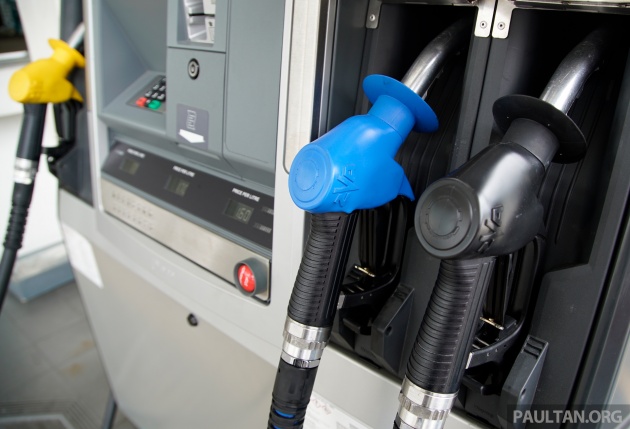An update on Euro 5-standard diesel, which replaced Euro 2M diesel at all retail pumps across Malaysia as of April 1. The fuel is available in two grades, one with a B10/B20 biodiesel blend and the other, a B7 blend as it is currently. This was confirmed by a number of players in the fuel retail industry after we reached out to them over the matter.
Essentially, Euro 5 B10/B20 is a direct replacement for Euro 2M diesel and will follow the pricing parameters set for that, including the price ceiling of RM2.15 per litre, while Euro 5 B7 will continue to be sold as a separate product, priced at 10 sen more per litre than Euro 5 B10 as it is now (currently, RM2.25 a litre).
That the new base fuel was going to be deployed was not a surprise, given that it had already been stated years ago. In December 2015, a federal gazette revealed that the new standard would be introduced on September 1, 2020 to replace Euro 2M. However, in June last year, it was decided that the rollout would be postponed to April 1 this year in light of the Covid-19 pandemic and constraints faced by various industries.
The April 1 rollout was mandated last month through the Environmental Quality (Control of Petrol and Diesel Properties) (Amendment) Regulations 2021 federal government gazette dated March 25. In it, it was also stated that the updated Malaysian Diesel Standards would see other properties being defined for Euro 5 diesel on a staggered basis, being fully completed on April 1, 2023.
The formal announcement made by environment and water minister Datuk Seri Tuan Ibrahim Tuan Man last week, however, contained nothing beyond the fact that the fuel was being introduced, prompting questions as to whether there was now only one unified Euro 5-grade diesel, and what the biodiesel blend would be.
Prior to the rollout, Euro 2M diesel contained a B10 (10% palm methyl ester and 90% regular diesel) or, in some locations, B20 (20% palm oil content) bio blend, while Euro 5, which has actually been available in Malaysia since 2014, contains a B7 mix.
In essence, nothing has changed from that beyond the new fuel being cleaner for the environment. While Euro 2M had a sulphur content of 500 parts per million (ppm), Euro 5 has a way lower sulphur content at 10 ppm.
Sulphur in diesel creates particulate matter (PM) during combustion, which is obviously not great for the environment, and simply put, the lower the content of sulphur, the lower the emission of pollutants. Aside from aiding the environment, a cleaner fuel also helps extend engine life and improves fuel efficiency. That there is no added cost to it should surely get no complaints from consumers.


As for the biodiesel content, the base Euro 5 follows levels seen previously, which is primarily B10 at present. Although the country introduced its B20 blend (20% palm methyl ester, 80% regular diesel) programme in February 2020, the nationwide implementation for that has been delayed. Originally scheduled for June this year, its full introduction has now been pushed back to early 2022.
Eventually though, the fuel will replace B10 as the primary biodiesel blend at over 3,400 stations nationwide, except in Cameron Highlands and Genting Highlands in Pahang and Kundasang in Sabah, where B7 biodiesel will continue to be used.
Meanwhile, the continued retail presence of Euro 5 B7 diesel as an alternative, if costlier, choice should be a relief to users not keen on using high blend biodiesel. There remains contention about the compatibility of B20 with engines, continuing the technical caution that first arose with B10, where it was claimed that the usage of biodiesel in grades higher than B7 may result in fatty-acid methyl ester mixing with motor oil, causing the oil to thin and possibly leading to sludging in the engine.
In terms of implementation, we asked if Euro 5 B10 had been fully rolled out across the country. At the time of publishing, only BHPetrol – which was the first to offer Euro 5 diesel in the country, in Johor – had responded by saying that its transition has been completed, with Euro 5 B10 now available at all its stations nationwide alongside its B7 blend. We await updates from elsewhere, as well as to whether any of the formulations have been revised with the new grade, and will report accordingly.
With the move, all retail fuels in the country now meet Euro 4 and Euro 5 European Fuel Directive standards. For petrol, RON 97 was the first to adopt the Euro 4M standard in September 2015, and RON 95 was set to follow suit in October 2018, but its introduction was postponed to January 2020.
As for the switch to Euro 5 petrol grades, that will eventually happen on September 1, 2025. The date was reiterated in last month’s gazette, which again outlined elements of the new Malaysian Petrol Standards for then. The complete specification for Euro 5 petrol is set to be completed by September 1, 2027 with final compliance achieved in the levels of benzene, olefins and aromatics.
The post Euro 5 B10 biodiesel is direct replacement for Euro 2M, same price – Euro 5 B7 blend remains, 10 sen more appeared first on Paul Tan's Automotive News.




0 Comments